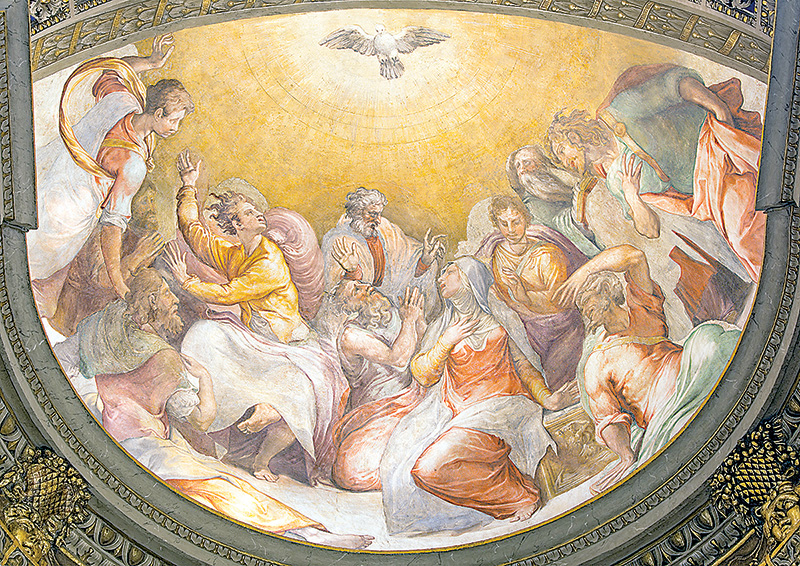
Credo: A 12-part series on the creed
Editor's note: This article is the eighth of 12 in a new series on the Creed by Deacon Matthew Newsome. Explore the series.
In the eighth article of the Apostles’ Creed we profess our belief in the Holy Spirit. What is a spirit? A spirit is a personal, non-corporeal being. Let’s break that down. It is a being, meaning that it is something that exists – spirits are not imaginary. It is non-corporeal, meaning that it is not physical. Spirits do not have matter; they are not made up of atoms or anything else in the material world. And it is personal, meaning spirits have rational intellects and free will.
Humans have spirits and physical bodies. Angels are pure spirits. But who is the Holy Spirit? The Holy Spirit is the spirit of God, but not in the same way souls are the spirits of human beings.
Humans have spirits, but we are not spirits, just like we have bodies but we are not bodies. We are spirit/body composites. God is not a composite being. God is one. You cannot break God down into parts.
God is also a Trinity. There are three Persons in God, but not three parts. Each Person of the Trinity is fully and wholly God, and all three are spirits. The Father is spirit. The Son is spirit. (The body He assumed at the Incarnation belongs to His human nature, not His divine nature.) And the Holy Spirit is spirit. When we confess in the Nicene Creed that “with the Father and Son He is adored and glorified” we affirm the divinity of the Holy Spirit by saying He is worthy of the same worship given to the Father and the Son.
So what makes the Holy Spirit different from the Father and Son, since all three are spirits? The Catechism defines the Holy Spirit as, “the personal love of Father and Son for each other… at work with the Father and the Son from the beginning to the completion of the divine plan for our salvation.” It is relatively easy for us to imagine the Father and the Son, as these are natural images for us (we all either have, are, or know human fathers and sons). But the Spirit is described variously as a wind, a flame and a dove. This can make it seem like the Spirit is harder for us to relate to, but in truth, the Spirit is most active in the world and in the life of the Church.
 The Holy Spirit is active in the work of creation itself. “In the beginning God created the heavens and the earth. The earth was formless and void, and darkness was over the surface of the deep, and the Spirit of God was moving over the surface of the waters” (Gen 1:1-2). The Holy Spirit gives order and purpose to the world, so that when God looks upon all He has made, He finds it “very good” (Gen 1:31).
The Holy Spirit is active in the work of creation itself. “In the beginning God created the heavens and the earth. The earth was formless and void, and darkness was over the surface of the deep, and the Spirit of God was moving over the surface of the waters” (Gen 1:1-2). The Holy Spirit gives order and purpose to the world, so that when God looks upon all He has made, He finds it “very good” (Gen 1:31).
The Holy Spirit is also active in a particular way in the creation of Man. “The Lord God formed man out of the clay of the ground, and blew into his nostrils the breath of life, and so man became a living being” (Gen 2:7). The word “breath” in Hebrew is “ruach” or “neshemah,” which in Latin is “spiritus.” God’s Spirit is the source of our life. Without it, we return to dust and ashes.
The Holy Spirit renews creation. “When You send forth Your spirit, they are created, and you renew the face of the earth” (Ps 104:29-30). In the same way, the Spirit renews and strengthens us. God tells us, “Take courage, for I am with you. My Spirit continues in your midst; do not fear” (Hag 1:4).
The Holy Spirit is also active in Jesus’ ministry. The Spirit overshadows Mary at the Incarnation (Lk 1:35). The Spirit anoints Jesus at His baptism (Lk 3:21) and leads Him into the desert to engage in spiritual combat with the devil (Lk 4:1-2). Jesus returns to Galilee saying, “The Spirit of the Lord is upon me because he has anointed me to bring glad tidings to the poor” (Lk 4:18).
On the day of the Resurrection, Jesus breathed on the Apostles saying, “Receive the Holy Spirit. Whose sins you forgive are forgiven them, and whose sins you retain are retained” (Jn 20:22).
It is the Holy Spirit who enables the Apostles to continue the redemptive work of Christ in the world. The Holy Spirit empowers the Church for its evangelizing mission. At Pentecost, “they were all filled with the Holy Spirit and began to speak in different tongues, as the Spirit enabled them to proclaim” (Acts 2:4).
The Holy Spirit also confirms each Christian as a member of the Church. “When the Apostles in Jerusalem heard that Samaria had accepted the word of God, they sent them Peter and John, who … laid hands on them and they received the Holy Spirit” (Acts 8:14, 17). The sacrament of confirmation is our anointing, our participation in Pentecost, our share in the apostolic mission to make disciples of all nations.
The Holy Spirit “comes to the aid of our weakness; for we do not know how to pray as we ought, but the Spirit itself intercedes with inexpressible groanings” (Rom 8:26). Jesus teaches that
“God is spirit, and those who worship Him must worship in Spirit and truth” (Jn 4:24). The Holy Spirit empowers our worship, “through Him, with Him and in Him, in the unity of the Holy Spirit.”
In the Mass, at the epiclesis, the priest calls down the Holy Spirit to “graciously make holy the gifts we bring to you for consecration” (Eucharistic Prayer III).
The Spirit makes us children of God. St. Paul writes that we have received “a Spirit of adoption… the Spirit itself bears witness with our spirit that we are children of God, and if children heirs, heirs of God and coheirs with Christ” (see Rom 8:14-17).
Finally, the Holy Spirit calls us to the consummation of our union with God in heaven. St. John writes in Revelation, “I saw the holy city, a new Jerusalem, coming down out of heaven from God prepared as a bride adorned for her husband. The Spirit and the Bride say, ‘Come’” (Rev 21:2).
In the fourth century, St. Basil the Great summarized the work of the Holy Spirit this way: “Through the Holy Spirit we are restored to paradise, led back to the Kingdom of heaven, and adopted as children, given confidence to call God ‘Father’ and to share in Christ’s grace, called children of light and given a share in eternal glory.” It is most fitting, therefore, for every Christian to pray,
“Come Holy Spirit, fill the hearts of Your faithful and kindle in them the fire of Your love.”
Deacon Matthew Newsome is the Catholic campus minister at Western Carolina University and the author of “The Devout Life: A Modern Guide to Practical Holiness with St. Francis de Sales,” available from Sophia Institute Press.




